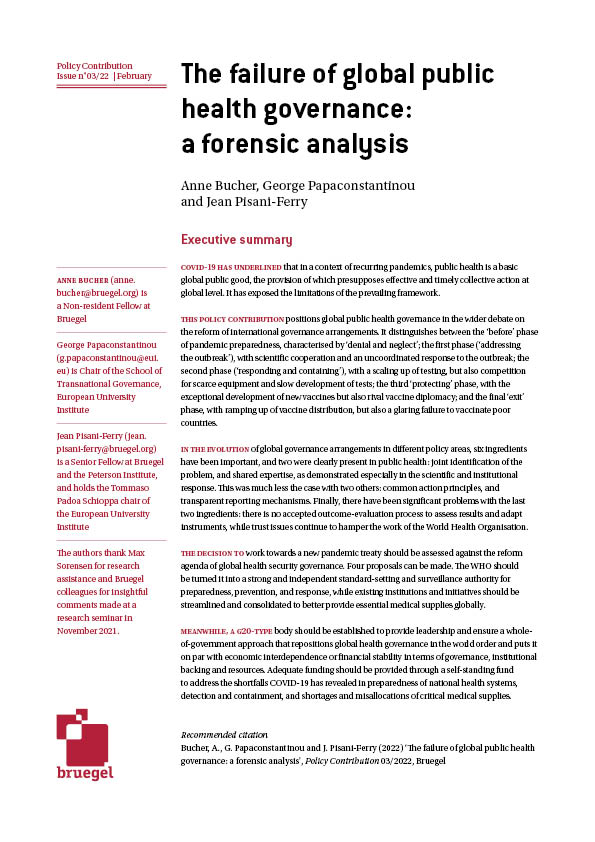Opinion
A K-shaped recovery and the role of fiscal policy
The spine of the letter represents the fall in activity at the start of the pandemic. Then there is a split, which leads to the two ‘arms’ that capture the different directions taken by economic activity in different sectors.
This opinion piece was originally published in the Money Review Section of Kathimerini and in El Economista.
The shape of the post-pandemic economic recovery has gone through many letter characterisations, from V to W, to land more or less on the letter K. The spine of the letter represents the fall in activity at the start of the pandemic. Then there is a split, which leads to the two ‘arms’ that capture the different directions taken by economic activity in different sectors.
Digital technology and pharmaceuticals, for example, have seen their activities boom. On the other hand, sectors including hospitality, tourism, and also energy, have seen partial or complete standstills. There have therefore been clear winners and losers from the pandemic.
Evidence shows that this K split that characterises different sectors holds also for individuals at opposite ends of the income distribution. After initial reductions in everyone’s income, the wealthy are now recovering fast, while lower earners are still struggling.
Any attempt to design further fiscal support for the remainder of the pandemic must account for this split, or it risks missing the point. The main role of fiscal policy therefore will be to support only those segments of the economy and society that are on the declining ‘arm’ of the letter K.
This is very much the logic behind the most recent fiscal rescue package in the US, which has three purposes. First is dealing with the health aspects of the pandemic, including assisting vaccination and making schools safe. Second is supporting those who have lost their jobs. Third is providing cash transfers to those with lower incomes. .
How does this K-shaped recovery apply to the fiscal needs in the EU? In a letter to her G20 colleagues, on 25 February, US Treasury Secretary Janet Yellen urged her counterparts, at the very least, not to step back from fiscal support, saying among other things that “If there was ever a time to go big, this is the moment”.
This will resonate with EU leaders who are about to discuss whether, when and how to return to the EU’s common fiscal rules, which are temporarily suspended. The European Commission’s latest economic forecast projects growth of 3.7% for the EU economy in 2021, but that estimate is very uncertain and growth will vary significantly among EU countries. There is therefore, an additional K-type split implied, beyond sectorial performance or income, that has to do with the geographical pattern of recovery.
Given differences between EU countries in the speed of recovery, when it comes to fiscal policy in the EU, the most urgent question is when the common fiscal framework should be reinstated. A recent study showed the differentiated impact of the pandemic based on how dependent each EU country’s economy is on external trade and on proximity-based professions, like services. This dependence will define also the pace of recovery.
The first evidence of variability in the recovery can be seen in the pace of new business start-ups compared to the rate of bankruptcies. Both numbers collapsed at the start of the pandemic. However, by the third quarter of 2020, the registration of new businesses had returned to pre-pandemic level, on average for the whole EU. Bankruptcies remain a lot lower than in 2019. This suggests that support continues to be extended to too many firms that would otherwise go bankrupt. Should fiscal support be phased out and such firms be allowed to fail instead?
A closer look at national data shows huge differences between countries. For example, the rate of new firm registrations was higher in France and Belgium (by 21.5% and 14.3% respectively), in Q3 2020 than in the same quarter in 2019. It was lower in Germany and the Netherlands (by -14.6% and -13.3%). The rate of bankruptcies was very low everywhere: France, -34.9%; Belgium, -32.3%; and -27.2% in Germany. The extent of fiscal support needed is therefore very different in different countries and it makes little sense to revert to the common fiscal rules framework while such huge differences exist.
Last, the unemployment rate in the EU has gone up by only 1.5% during the pandemic. This is a huge success if one considers the depth of the recession and is due to concerted fiscal efforts to keep people in jobs. However, a closer look at the numbers tells us that there has been a widening of inequality when it comes to preserving employment. This is very visible across the lower educated, the young and women. The evidence shows that the pandemic risks wiping out the progress in gender equality of the last 25 years. Job-retention schemes and national fiscal policy overall will have to be a lot more targeted to address these split effects.
For the time being, fiscal policy design should not be based on averages as they mask these K-type splits. In the EU, for as long as differences in the pace of recovery are economically significant, fiscal policy at the national level needs to be allowed to deviate from EU rules.
Republishing and referencing
Bruegel considers itself a public good and takes no institutional standpoint.
Due to copyright agreements we ask that you kindly email request to republish opinions that have appeared in print to [email protected].












